1.
Until the pandemic forced us into hiatus, I curated a reading series for emerging writers in New York City. For 13 years, we met monthly at KGB Bar, a literary venue in the East Village. The bar was rarely full, but it was always a chore to get people to quiet down; we encouraged readers to invite friends, family, and other writers. On the best nights, the place was full of convivial anticipation, like we were throwing a big, bold send-off before these promising writers lit out to new territory.
Standing at the podium before events, the sights and sounds often reminded me of the wet, snowy Sunday evening when I heard the late, great Robert Stone read in the very same room. He was in the last years of a long life. His flowing beard was all white and emphysema made a whisper of his gravelly voice. His audience had dwindled and there were fewer people in the room that night than on evenings when I hosted readings for less accomplished authors. This is just one of the many lessons Stone taught me: that you can be nominated for four National Book Awards and a Pulitzer—and still face a half empty room at the end of your career.
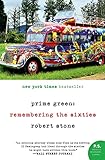 You can get the full fathom five of Stone’s biography from any of a dozen sources. Stone himself wrote a memoir, Prime Green, that tracks through his Catholic school boyhood, the burden of growing up as the son/caretaker of a schizophrenic mother, and the hows and whys of his decision to run away and join the Navy as a young man. At the beginning of his career, he famously tripped with Ken Kesey and the Merry Pranksters. His second novel was made into a movie starring Nick Nolte. He once joked to an interviewer that he always ended up running into the much more famous author Paul Auster at parties. He was among the literati in the era when being seen around town was a part-time job, long before Entertainment Tonight and ages before social media made celebrity a full-time out-of-body experience.
You can get the full fathom five of Stone’s biography from any of a dozen sources. Stone himself wrote a memoir, Prime Green, that tracks through his Catholic school boyhood, the burden of growing up as the son/caretaker of a schizophrenic mother, and the hows and whys of his decision to run away and join the Navy as a young man. At the beginning of his career, he famously tripped with Ken Kesey and the Merry Pranksters. His second novel was made into a movie starring Nick Nolte. He once joked to an interviewer that he always ended up running into the much more famous author Paul Auster at parties. He was among the literati in the era when being seen around town was a part-time job, long before Entertainment Tonight and ages before social media made celebrity a full-time out-of-body experience.
“You were part of that world,” the interviewer Christopher Bollen said to him in 2013, talking about the druggy counterculture era. “But you have a rare career in that you moved beyond it. How?” Stone’s response was characteristic of the man: pointed, honest, and unglamorous. “I really, really wanted to write,” he said. He knew that his reach was beyond his grasp as a young writer. “I wanted to be a goof on the bus, but I wanted to write more.” So he went to work.
If you consult with the sages at Encyclopedia.com, this is how all that effort worked out for him: “Robert Anthony Stone (born 1937) was an American novelist whose preoccupations were politics, the media, and the random, senseless violence and cruelty that pervade contemporary life both in the United States and in parts of the world where the United States’ influence has extended, such as Latin America and Vietnam. His vision of the world is dark but powerful.”
Well, yes; but also, no.
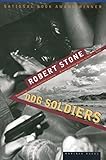

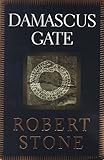 The novelist Madison Smartt Bell, in an encomium in The New Yorker after Stone died in 2015, claimed that all Stone novels include the character of “a man whose idealism has been blunted by experience.” Certainly, this is true of Stone’s best books, by which I mean (in order): Dog Soldiers, A Flag for Sunrise, and Damascus Gate. In that same 2015 essay, Smartt observes that for all the protagonists of these books, the main narrative is of a redemption that must be earned. Nothing is handed to them. “Stone and his characters struggle with all received ideas at a very high level of intellectual honesty.”
The novelist Madison Smartt Bell, in an encomium in The New Yorker after Stone died in 2015, claimed that all Stone novels include the character of “a man whose idealism has been blunted by experience.” Certainly, this is true of Stone’s best books, by which I mean (in order): Dog Soldiers, A Flag for Sunrise, and Damascus Gate. In that same 2015 essay, Smartt observes that for all the protagonists of these books, the main narrative is of a redemption that must be earned. Nothing is handed to them. “Stone and his characters struggle with all received ideas at a very high level of intellectual honesty.”
In interviews and essays, Stone never denied that he wrote stories he hoped would capture the fancy of readers. He was not writing for his private muse. Nor was he a David Foster Wallace, tortured by inner Furies, pouring his thoughts onto the page in a losing bid for freedom. You can still watch Stone speak in numerous video interviews on YouTube; he smiles often, wears professorial jackets and ties, and lounges at tables beside a fire. Stone wrote big, rollicking stories like Conrad, Melville, and Dickens because those were the kind of stories that he loved and were large enough to suit his themes. He was a writer who lived in the world and wrote stories full of living.
On the word-by-word level, his work has the jostle and sting of real life; as a writer he inhabited the people in the stories in order to tell their tales. Speaking of A Flag for Sunrise with Kay Bonetti in 1982, he expresses the surprise he felt when two of his characters broke out into a dramatic quarrel at one point. “The day I started writing that piece I didn’t realize that was going to happen,” he said. “It just developed as I wrote the dialogue and imagined myself into the situation.”
For all his timeliness of story and milieu, however, you cannot approach a Robert Stone novel at high speed. He published four books after 1998; all of them have strengths but also none of them feel quite of our time. I suspect this is why his popularity began to wane after the publication of Damascus Gate. You either slow down and let the chemicals of his words do their thing, or you might as well fly on by.
2.
Stone’s best claim to literary fame is the 1975 National Book Award, when the selection committee picked his third novel, Dog Soldiers, as its fiction prizewinner. Stone’s description of his academic experience at Stanford a few years earlier could just as well describe this deeply paranoid masterpiece: “I spent a lot of my time, when I should have been writing, experiencing death and transfiguration and rebirth on LSD in Palo Alto.”
What were the National Book Award judges thinking when they chose to award the prize to this novel, a druggy, rough tale of a playwright-turned-journalist who loses his shit in Saigon and manages to ravage his entire life before the last page? Cast in granite prose, oracular in the best and worst ways, full of scenes that show but confide less than a gruff Midwestern boyfriend, Dog Soldiers has a thrilling plot, but I’m not sure I could tell you what happens in it, even on a close reread. Did the judges find in the book a reflection, darkly, of the chaotic post-Nixonian world in which they lived? Certainly, this is the easy go-to explanation for the adjunct profs who include it on reading lists and the marketing copywriters who prepared promo material for the latest reissue in 2018. It’s a book about hippies! ’Nam! Failed authority! LSD! Well, yes; and no. Dig a little deeper, and, as with Stone’s fiction, a complicated, interconnected counter story begins to take shape.
 Fact: the year before Dog Soldiers won the National Book Award, the award was discontinued, briefly. So perfectly Stone. In 1974, the prize jury chose Gravity’s Rainbow by Thomas Pynchon, a writer so writerly that he refused to give interviews. This was apparently the last straw for the publishers who underwrote the prize. They cut their funding. Completely. National Book Award organizers refused to give up, though. They assembled a temporary committee to give their award one more time. They begged the likes of Exxon and Jackie Kennedy Onassis to donate enough moola to keep the lights on. It was one more sign of the times in an age when no institutions seemed like they were going to last. Exactly the kind of world that Dog Soldiers paints in miniature. A perfect choice. Almost as if it were the work of fate. Fate of the kind that flickers in the flames of Stone’s best work. Fate that you can laugh at and say you don’t believe in, but that still has a chance of being true. Robert Stone had to win the prize that year. Because we all needed an author preoccupied by outsiders to be granted the status of a literary insider—so he could go on writing, thinking, and teaching all of us for the next four decades.
Fact: the year before Dog Soldiers won the National Book Award, the award was discontinued, briefly. So perfectly Stone. In 1974, the prize jury chose Gravity’s Rainbow by Thomas Pynchon, a writer so writerly that he refused to give interviews. This was apparently the last straw for the publishers who underwrote the prize. They cut their funding. Completely. National Book Award organizers refused to give up, though. They assembled a temporary committee to give their award one more time. They begged the likes of Exxon and Jackie Kennedy Onassis to donate enough moola to keep the lights on. It was one more sign of the times in an age when no institutions seemed like they were going to last. Exactly the kind of world that Dog Soldiers paints in miniature. A perfect choice. Almost as if it were the work of fate. Fate of the kind that flickers in the flames of Stone’s best work. Fate that you can laugh at and say you don’t believe in, but that still has a chance of being true. Robert Stone had to win the prize that year. Because we all needed an author preoccupied by outsiders to be granted the status of a literary insider—so he could go on writing, thinking, and teaching all of us for the next four decades.
3.
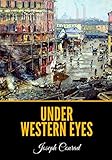
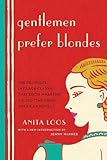 The first time I tried to read Robert Stone, I couldn’t stand his prose style. I was 22. Stone’s second masterpiece, A Flag for Sunrise, was on a grad school syllabus that also included the likes of Clockers, Under Western Eyes, and Gentlemen Prefer Blondes. The sine non qua for inclusion was that each book operated in a genre but also rose above its intentions, a concept that my thesis advisor and mentor, David Plante, also inculcated into our thinking in weekly creative writing workshops. He never said as much, but I believe that what Plante was trying to teach us was that if we were to become decent writers, which is to say writers worth our salt, we had to be contextual readers.
The first time I tried to read Robert Stone, I couldn’t stand his prose style. I was 22. Stone’s second masterpiece, A Flag for Sunrise, was on a grad school syllabus that also included the likes of Clockers, Under Western Eyes, and Gentlemen Prefer Blondes. The sine non qua for inclusion was that each book operated in a genre but also rose above its intentions, a concept that my thesis advisor and mentor, David Plante, also inculcated into our thinking in weekly creative writing workshops. He never said as much, but I believe that what Plante was trying to teach us was that if we were to become decent writers, which is to say writers worth our salt, we had to be contextual readers.
My first reading of Stone was troubled by the fact that I was addicted to Cormac McCarthy at the time. For my money, McCarthy is perhaps the only other major male author of the late 20th century who writes convincingly in the cut of the moment. McCarthy and Stone were born within four years of each other. They both had a stint in the military. Both write/wrote painfully slow, labored over their craft, and had very little commercial success at first. But in form and vision, they are opposing calculations on either side of an equals sign.
I read perhaps two pages of A Flag for Sunrise before putting the book back down again. The pace felt too slow. The sentences were sharp but stilted. Characters kept starting and stopping and staring. There was a nun with a man’s name. A lieutenant who was clearly also a drunk. Familiar and unfamiliar all at once. I attended the seminar session on the book without having read A Flag for Sunrise at all. How very Robert Stone of me. I had high hopes for the novel; I was myself trying to write a book that I envisioned as a literary novel with a great plot. That perfect fusion of high and low culture. But I was too eager, too hurried in my work, too starry-eyed with the idea of being done.
Cormac McCarthy novels reward you on a page-by-page basis, or at least they do if his stiff prosaic mescal is your kind of thing. A Stone novel takes longer to get going, and even longer to alter your insides. A Cormac cocktail hits you before the ice cubes melt; the work of Robert Stone will only be clear the next morning, when you realize that you blacked out hours before you got home.
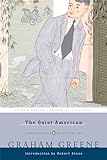
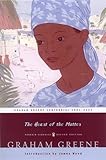
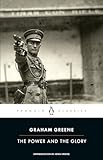 I returned to A Flag for Sunrise a decade later. I revisited Stone in part because I had run out of Graham Greene novels worth my time. After my Cormac McCarthy phase ended, I suffered a long bout of Greene fever. God, how I adored Greene’s books. I still have flash burns on my heart from the pages of The Quiet American, The Heart of the Matter, and The Power and the Glory. To learn more about Greene as a writer, I had even gone so far as to read Greene on Capri, the memoir by Shirley Hazzard (herself a great writer, criminally overlooked both before and after she died).
I returned to A Flag for Sunrise a decade later. I revisited Stone in part because I had run out of Graham Greene novels worth my time. After my Cormac McCarthy phase ended, I suffered a long bout of Greene fever. God, how I adored Greene’s books. I still have flash burns on my heart from the pages of The Quiet American, The Heart of the Matter, and The Power and the Glory. To learn more about Greene as a writer, I had even gone so far as to read Greene on Capri, the memoir by Shirley Hazzard (herself a great writer, criminally overlooked both before and after she died).
The rediscovery of Stone was a relief, and a blessing, but not because he was aping Greene. There are plenty of lesser writers who do just that. No, Stone was a find because he added to what Greene was doing. His work possesses the urgency of Greene—the sense of people battling against the dark authorities of this world—but also something else, something that took me many novels and many hours of consideration to realize was lacking in Greene’s novels: a love of living.
Stone was often asked by interviewers for his thoughts on Graham Greene. He was never ambiguous: “He is not a favorite of mine,” he told Charles Ruas in a 1981 interview. He speculated that his antipathy was due to being compelled by nuns to read Greene and Waugh as a schoolboy. Stone was still clinging to that story when he spoke in 1982 to the Missouri Review. But by the end of his life, during his 2015 interview with Christopher Bollen, he no longer felt the need to tiptoe around his deeper feelings. “I always knew I hated Graham Greene,” he said, “even though I thought he was a really good writer.”
Stone’s antipathy, I think, was not professional so much as personal. Graham Greene, for all his talent as a writer, was not a good man. Just about 10 years after Greene died, the Daily Mail wrote a long, dark hit piece on him. The article is a slog through a great writer’s sins. A photo of Greene in late age is captioned as follows: “A man without honour: Graham Greene was an alcoholic who abandoned his wife and two children for affairs with a series of married mistresses.” I learned from the article that late in life, Greene tried to start a brothel on a Portuguese island. And that he shared a house in Italy with an avowed pederast. Asked about his estranged children, Greene is reported as saying: “I think my books are my children.” Graham Greene was the kind of person that no one would want to be constantly compared with. Not if you really cared about the company that you are perceived to keep. And certainly not if you were someone as humanistic, thoughtful, and apparently kind-hearted as Robert Stone.
Perhaps the important difference between Stone and Greene is that while Stone “really, really” wanted to be a writer, he wanted equally to be a good person. I don’t mean in the personal sense, although that seems to have mattered to Stone, too. I mean in the sense of saying things that help guide his readers to a better understanding and appreciation of the world. In the very first words of a taped interview with the Writer’s Institute in 1996, Stone says that people need stories in the same way that the waking mind needs dreams. We put together narratives in order to make sense of life. The punch line of a joke, he goes on to say, is actually a forced recognition of how things are. There is no natural narrative of things; it’s all just out there. “It is up to human will and human ingenuity to compose all this into a narrative.”
4.
If at this point you have in your mind the image of Robert Stone as a neo-Papa standing at his desk and writing out novels by long hand–then you are mistaken. Nor was he a Melvillian scrivener hunched over a desk for hours to write in a slanted longhand better suited for logging barrels of salt pork. The galloping narrative of his books will put you in mind of Stendahl; the moral weight of his vision is on level with Dostoevsky. But those two novelists dictated their work to stenographers. None of this applied to Stone. He was a typing man. He joined the navy as a radio operator, as he reports in his memoir. Later, as he told Bollen in 2013, he learned to type by taking Morse code. “I was using the typewriter from day one,” he said.
Not an Olivetti, either. A Paris Review feature from 1985 describes Stone as working in a cluttered attic at a table just large enough to hold his word processor. That’s right, a fully modern word processor. Unlike Cormac McCarthy, the image of the artist is not meant to be confused with the images in the work. Stone is neither ascetic nor saint. He was just a writer, a big-hearted one.
A picture of Stone in the mid-2010s in the Paris Review shows no fewer than two computer screens. One of them, a laptop with his reading glasses resting on the keys, is—I regret to inform the steampunks among you—almost certainly a MacBook. He was not a simple throwback. Or a caricature. His wife was a waitress when he met her. He remained married to her for his entire adult life. They lived in a simple house in Connecticut on the shore, and their two children, a boy and a girl, grew up and moved out and started their own lives as children everywhere are wont to do.
His work reads as if it were composed to the tune of clanging blacksmiths and left to cool under the stars somewhere far from land. This is the conundrum of good writing. It can take you anywhere. But in Stone’s case, the words you read were almost certainly crafted in a quiet place, by one person, typing in solitude, hopeful of the value of the time spent, but equally certain that it may never mean anything much to anyone. This is the gamble.
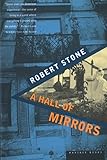 Stone suffered to bring the right words forth in the years before acclaim and even afterward. He worked on his first novel, A Hall of Mirrors, for six years. In the era of hot takes and from-the-hip tweets, six years is an eternity. But it is what it takes when you are groping in the dark as a writer.
Stone suffered to bring the right words forth in the years before acclaim and even afterward. He worked on his first novel, A Hall of Mirrors, for six years. In the era of hot takes and from-the-hip tweets, six years is an eternity. But it is what it takes when you are groping in the dark as a writer.
I find the story of how long Stone labored on his initial book to be both inspirational and validating. I spent six years working on my first novel. It was my thesis while at Columbia. Stone labored over his work while a fellow at Stanford. He had to keep working on the manuscript after he graduated, as did I. He struggled to work and write at the same time. As he told the Paris Review about that first book: “I’d work for twenty weeks and then be on unemployment for twenty weeks and so on. So it took me a long, long time to finish it.” This is the writing life. I am writing the first draft of this essay while I sit on a wooden bench in a coffee shop in Harlem where ironically they are playing Creedence Clearwater Revival’s 1971 single, “Have You Ever Seen the Rain?” I have not been employed full time for months, except for a few consulting gigs. I have been desperately writing this whole time, concocting and executing the first draft of a new novel and rounding out essays like this one that have been ricocheting around in the steel drum of my mind for ages. You find a way to get the work done whenever and however you can, almost as a sidebar to real life. And yet it’s the part of life that you most want to talk about with an interviewer from a literary magazine. Stone anticipates everything that I feel as a writer. There is this long exchange, from that same Paris Review interview, which might as well be a diary entry from my own life, except in my case the book that I’m jazzed over is called Likeness, and it won’t win a National Book Award, because I’m no Robert Stone, but the feelings are all the same:
INTERVIEWER
Is writing easy for you? Does it flow smoothly?
STONE
It’s goddamn hard. Nobody really cares whether you do it or not. You have to make yourself do it. I’m very lazy and I suffer as a result. Of course, when it’s going well there’s nothing in the world like it. But it’s also very lonely. If you do something you’re really pleased with, you’re in the crazy position of being exhilarated all by yourself. I remember finishing one section of Dog Soldiers—the end of Hicks’s walk—in the basement of a college library, working at night, while the rest of the place was closed down, and I staggered out in tears, talking to myself, and ran into a security guard. It’s hard to come down from a high in your work—it’s one of the reasons writers drink.
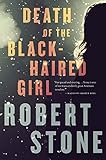 Stone never figured out how to write quickly. He kept his standards on the top shelf. He spoke about this in one of his last interviews, with Tin House. The editor asks him about the plot of his final novel, The Death of the Black-Haired Girl. (A novel that, I must confess, I could not finish.) He insists that he does not have a plan for his work; that it just unfolds as he discovers it. “So you are not,” the interviewer asks, “in the Nabokov camp of treating your characters like “galley slaves”? I can almost hear Robert Stone chuckling in response. “Well,” he said, “I don’t treat them very well. But, no.
Stone never figured out how to write quickly. He kept his standards on the top shelf. He spoke about this in one of his last interviews, with Tin House. The editor asks him about the plot of his final novel, The Death of the Black-Haired Girl. (A novel that, I must confess, I could not finish.) He insists that he does not have a plan for his work; that it just unfolds as he discovers it. “So you are not,” the interviewer asks, “in the Nabokov camp of treating your characters like “galley slaves”? I can almost hear Robert Stone chuckling in response. “Well,” he said, “I don’t treat them very well. But, no.
In an interview with Kay Bonetti, in 1982, she said: “Some critics feel you lost control of the structure in both A Hall of Mirrors [his second novel] and Dog Soldiers.” Stone’s response: “Yes. I guess I lost control.” And then he adds, importantly, and perfectly in tune with his Zen persona: “I’m pretty satisfied with the way they turned out.” Later in the same interview, he elaborates: “I see a great deal of human life limited, poisoned, frustrated, by fear and ignorance and the violence that comes from it…I think some of the people I write about are trying to get above that and get around it somehow.”
How a Stone novel ends is perhaps more important than any other fact about it. The ending is where at long last the slowly moving lines converge. The end is the closest we will ever get to the direct sunlight of his ideas. I remember distinctly where I read the ending of Damascus Gate. I was seated on a subway car headed to the Upper West Side apartment where I lived with my wife and daughter. I was an established adult by then, full-time job, mortgage, a little girl who called me papa. All that fell away as I read the book. The only world I knew as I hurtled under the streets of New York was the world of the catacombs under Jerusalem as reported to me by Stone. The characters are lost, confused, and the predators and prey are all mixed up. As a reader, I recall my heart pounding as I turned the pages. But truth be told, I also remember being confused. Like, seriously confused. As a character in a Stone novel might say: What the actual fuck is going on?
All of Stone’s work is about the confusing fate that lies in wait behind the world of likely events. The startling break. The upsetting loss, when all the odds were in your favor. Being confused, overwrought, out of luck, or nearly so—all of Stone’s characters arrive at this moment. And then they get up and push onward. You may or may not like his heroes. But you have to admire their will to live. There are moments in his work that anticipate the modern anti-heroes of Breaking Bad or True Detective. I cannot be the only person who saw a dark reflection in the ending of True Detective season two, when Frank Semyon bleeds out in the desert, and the ending of Dog Soldiers, when the mortally wounded Hicks walks as far as he can along a railroad track. Both men are deeply flawed and filled with hallucinations. Both men are dead long before they realize it.
Arguably, it is in film and television where you can locate Stone’s true heirs. Plenty of male novelists try to mug their way through tough-guy first novels a la Stone, but in so doing they confuse him with the likes of Hemingway, Mailer, and Roth. There’s no strut to his prose; there’s nothing self-aggrandizing in Stone’s work, nor did there seem to be in the man. If anything, his work is about the extinguishment of the self in a Buddhist sense. “You’ll never find Robert Stone in a Robert Stone book,” Wallace Stegner is said to have remarked famously after reading Dog Soldiers.
5.
Five years have passed since Stone’s death. Other than a brief burst of appreciation after his passing, in the form of admiring words from peers and former students alike, at this point his floating pyre has drifted out to sea. I suspect that the rolling tide of literary canonization will not bring him back to shore. His vision is too intentionally arch; his prose style far too mandarin. This saddens me, but I do not think that it would sadden Stone; certainly the man that I met once, very briefly, had no other expectation for what would happen in the world that went on without him.
I heard Stone speak and read from his memoir in December of 2009, on the Sunday evening when he appeared on a double bill for a book promo event at KGB Bar. There was a snowstorm coming, according to the weather reports, and a wet snow had started. I suspect this depressed turn out a little. But it also made the room feel brighter and warmer.
Stone arrived shortly after I did, entering alongside a taller, younger man. Later, I would learn this was Madison Smartt Bell. Bell was an accomplished novelist in his own right, and he had a book of his own to promote; but there was in his posture, his gesture, his way of introducing Stone to all of us, a clear deference for the literary lion in our midst. For his part, Stone had no airs. He had, I would learn later, visited the bar numerous times for readings. In an Identity Theory interview in 2003, he said to the interviewer: “I was in KGB last night and I think it’s very vital, even more vital than it used to be.” He seemed at ease when he stood at the lectern, adjusting the rickety lamp to illuminate the pages he carried. He wore reading glasses on the end of his nose. His eyes smiled when he glanced up.
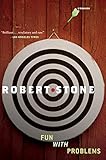 He read a section from his memoir and the entire text of a short story. The story, “Honeymoon,” would appear three years later in his second story collection, Fun with Problems. At the story’s end, the main character swims to his death while scuba diving, plunging into the “uncolored world of fifteen fathoms. The weight of the air took him down the darkening wall.”
He read a section from his memoir and the entire text of a short story. The story, “Honeymoon,” would appear three years later in his second story collection, Fun with Problems. At the story’s end, the main character swims to his death while scuba diving, plunging into the “uncolored world of fifteen fathoms. The weight of the air took him down the darkening wall.”
Afterward, the room was still with the quiet trance of a heady draught. Stone took a place at the wall near a corner to sign books. I hadn’t realized there would be a signing. Like a fool, I had not thought to bring any books. Clearly, others had a better sense of what to expect. One young man had brought a handled paper bag full of Robert Stone hardcovers. Stone, with a chortle, signed each one.
Someone from Houghton Mifflin was selling paperback copies of Prime Green. I bought one and then apologized when I slid it under Stone’s nose. I loved Dog Soldiers, I told him. I should have brought a copy with me. Indeed, I had read the book just two months earlier in huge gulping doses. He nodded. Your work is inspirational, I said. I had spent much of my time in line figuring out what to say, what wouldn’t be too fawning but would still convey the proper reverence.
“You’re a writer?” he asked.
“Yes,” I said, although I felt sheepish making this claim.
“Are you working on something? Is it going well?”
“I’m–I’m trying,” I said.
He nodded. He understood. He had seen thousands of versions of me before. I suspect he saw me as a lost child, one so alone as to not know how to ask for help. I was, at this time, twice divorced from literary agents, unpublished after a decade of trying, with not even a short story publication to my name. He told me, simply, to keep at it. That the writing is its own reward. The kind of wisdom that, to a young man, seems like resignation, but that to a man at middle age sounds a lot like fortitude and patience. He asked my name, double checked how to spell it, and then wrote his name and a quick line of encouragement on the title page and handed the book back to me.
After that I went down the bar’s long creaky stairs and out into the wet snowy night and back into the uncertainty of a writing life still largely unlived. I have been thinking about our short exchange ever since.
In a conversation with Robert Birnbaum after the release of Damascus Gate, Stone spoke about the epigraph in the book: “Losing it is as good as having it.” This is a line devoid of poetry and hardly worth an epigraph, unless you’ve bought into the long arrow path that passes through Stone’s oeuvre. As Stone explained to his interviewer, the quote wiped him out when he first heard it. “That which we have,” he said, “we invariably lose. And at the same time, it can’t be taken away.”
Stone was trying to say this same thing a decade earlier at the end of A Flag of Sunrise, when Holliwell is being rescued by a father and son who don’t speak English and seem hesitant to take the bloodied protagonist into their boat: “A man has nothing to fear, he thought to himself, who understands history.”
Losing everything, Stone tells us, is far better than never having anything at all. That full ironic detachment is a lesson that still resonates in our post-Cold War, post-American, pandemic-rankled world—with the empire teetering, so many of our heroes in retreat, and the very idea of grand masters in question, when the notion of a canon is more punch line than party line. Who can be a master? Who can speak for us all? Who is worthy? No one, obviously. But there are some voices that offer more to a listener than others. Stone’s is one of them.
Image Credit: Publishers Weekly.









